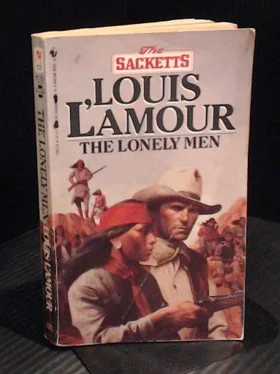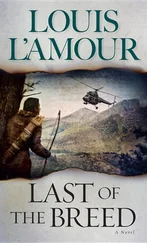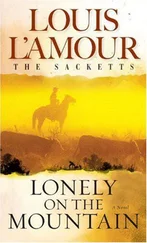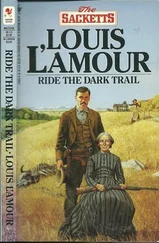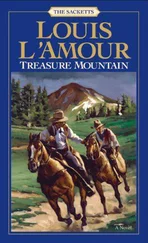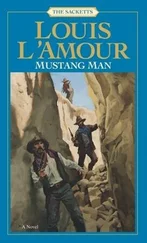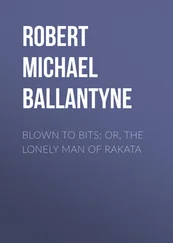Louis L'Amour - The Lonely Men
Здесь есть возможность читать онлайн «Louis L'Amour - The Lonely Men» весь текст электронной книги совершенно бесплатно (целиком полную версию без сокращений). В некоторых случаях можно слушать аудио, скачать через торрент в формате fb2 и присутствует краткое содержание. Жанр: Старинная литература, на английском языке. Описание произведения, (предисловие) а так же отзывы посетителей доступны на портале библиотеки ЛибКат.
- Название:The Lonely Men
- Автор:
- Жанр:
- Год:неизвестен
- ISBN:нет данных
- Рейтинг книги:4 / 5. Голосов: 1
-
Избранное:Добавить в избранное
- Отзывы:
-
Ваша оценка:
- 80
- 1
- 2
- 3
- 4
- 5
The Lonely Men: краткое содержание, описание и аннотация
Предлагаем к чтению аннотацию, описание, краткое содержание или предисловие (зависит от того, что написал сам автор книги «The Lonely Men»). Если вы не нашли необходимую информацию о книге — напишите в комментариях, мы постараемся отыскать её.
The Lonely Men — читать онлайн бесплатно полную книгу (весь текст) целиком
Ниже представлен текст книги, разбитый по страницам. Система сохранения места последней прочитанной страницы, позволяет с удобством читать онлайн бесплатно книгу «The Lonely Men», без необходимости каждый раз заново искать на чём Вы остановились. Поставьте закладку, и сможете в любой момент перейти на страницу, на которой закончили чтение.
Интервал:
Закладка:
There were a dozen cottonwoods, some mesquite and willows, and slopes green with grass, and through the trees a glimmer of water. I could hear birds twittering.
The horses tugged at their bits, wanting to go forward. Winchester in hand, I walked them slowly, ready with a spur if need be.
Suddenly my way was blocked by a low stone wall that looked to be a part of one of those trincheras the ancient people built to terrace and till their land, or sometimes for dams. I'd seen a lot of them in Mexico.
Dismounting, I led the horses around it and down to a broken place in the wall, and saw something dark and shadowy through the trees. There was no sound but the water, and the rustle of the cottonwood leaves. I walked ahead to an opening among the trees, and came to an ancient ruin. It had once been a considerable structure, built right from the edge of the pool back to the cliffs where it joined the native rock.
Only the floor remained, and a corner of a wall that reached up to six feet, slanting down to no more than three feet near the water. There was green grass all around, and a stillness that came from utter isolation.
First off, I let the horses drink sparingly, and drank myself, and then filled Rocca's canteen. All the while I kept my ears tuned for any sound. But there were no tracks around that I could see, no signs of campfires, nothing to show anybody had been here at all in years.
Picketing the horses, I found a corner of the wall that protected me on two sides. A pile of fallen adobe bricks mingled with chunks of rock that had been used in the walls formed a partial breastwork on the other sides.
Tired as I was, there was no sleep in me. Places like this made a man sort of sad. Somebody had lived here, and judging by the look of the place, different people at different times. There had once been a building of native stone. It had fallen in and been rebuilt with adobe and rock, and it looked as if the last time was no more than thirty, forty years back. Indians had perhaps built the place first, and rebuilt it, too. Later white people had settled in here until driven out.
It was a quiet place. A small garden patch had been worked at one time, and there was a meadow where hay might have been cut, but nobody could live long in such a place with the Apaches on the rampage.
I settled down, and after a while I slept. I awoke when the morning sun began to filter through the leaves. Everything was as quiet as before. I watered the horses, saddled them, and prepared to move out, but first I had scouting to do.
There were crude steps cut from the rocks at one side, taking advantage of natural steps left by the erosion of rock layers. Climbing these, I found a natural hollow that had been shaped by hand into a lookout of some comfort, with a view in all directions.
For several minutes I studied the desert, but saw nothing. Back down below again, I dug into my saddlebags for the small packet of coffee I always carried for emergencies. Often I carried some jerky and flour, but now there was only the coffee.
I built a small fire, and rinsed out an old clay jar I found. When I'd made coffee I filled a cup and prowled around, and finding some chia, I gathered a handful of the seeds and ate them. Then I went up for another look.
Off to the north I glimpsed a buzzard. There might be a dead steer, or it might be one of my friends, and buzzards do not always wait for a man to die.
Due north I rode, then I swung wide to the east, cutting for a sign. Whatever was up ahead must have left tracks getting there, and I wished to find out what I was up against.
"Tell," I told myself, "you better ride easy in the saddle. I think you're headin' into trouble."
That black nicked an ear at me as if to show he agreed. A lonely man a-horseback in wild country gets to carryin' on conversations with his horse, and some horses become right knowledgeable and understanding.
No tracks. I rode up on the east of where the buzzard circled, and swung in closer. Standing in my stirrups I looked the country over, and at first I saw only a lot of prickly pear around, and some clumps of cholla, all white thorns on top, brown underneath.
Then I saw the horse -- a horse down, a saddled horse.
Circling around it, rifle in hand, I taken a chance and called out: "Spanish? Is that you?"
A couple of buzzards roosting in a palo verde tree nearby looked mighty upset with me, and one of them dropped his wings as if to scare me off or stampede my horses.
No answer came back. So I cut a little closer, then drew up and looked around.
It was all just as it should be, sunlit and still.
My black was curious, too. He could sense something I could not, and though it made him curious, it was something he shied from. Probably it was the dead horse.
I walked him slowly forward, the hammer of my Winchester eared back for trouble.
The shirt was what I saw first, men the boots, and the Mexican spurs with the big rowels. It was Spanish.
I swung down and, having tied the black to a mesquite, I walked up to him.
He was lying face down in the sand, but he had pulled his saddlebags across his kidneys, so he'd been alive and conscious when he hit the ground. He knew that buzzards went for the eyes and the kidneys first, so he'd rolled on his face and pulled those saddlebags over him. They might not help much, but getting them off him might bring him to enough to fight the buzzards off.
Lifting the saddlebags free, I rolled him over.
There was blood all over the front of him, dried blood that seemed to come from a shoulder wound. And there was blood lower down that came from some place in his middle. But he was breathing.
We were right out in the open, and those buzzards could attract more than me, so, good for him or not, we had to move.
He muttered something, so I tried to let him know who was with him. "It's all right, Spanish," I said. "You'll see that girl in Tucson yet."
There was no time for fixing him up at all. Gathering him into my arms, I went with him to the spare horse and put him in the saddle, then I lashed his wrists to the pommel and his boots into the stirrups. I taken his saddlebags, although what was in them I didn't know. Then I checked his horse, but the animal was dead. There was a rifle in the saddle scabbard, so I took it along. There was no canteen.
We rode out of there at a good clip. The country ahead promised nothing. We had two, three days to cross the border, but we'd not be safe until we got to Pete Kitchen's or to the settlement on the border.
Taking advantage of every chance to mask my trail, and trying to keep down the dust, I rode north, leading Spanish on Rocca's horse. The wind was picking up a mite, which might drift enough sand to cover my tracks, but there was small chance it would be in time. Several times I slowed down, checking animal tracks, and watching for any sign that might indicate water.
The trail behind was empty, and the trail ahead looked clear. I rode in my own small world of sunlight, the movement of horses, and the smell of dust and sweat. Ahead of me, on the right, a sawtooth range showed itself above the flatter country around us.
I slowed my horse to a walk, for there were dark streaks of sweat along his flanks. An arroyo opened ahead of me, and I rode into it and found a way up the opposite bank. A towering butte was ahead for destination.
The bullet smashed against the pommel of my saddle, then ricocheted away with a nasty whine, and the heavy report of the rifle followed. Slapping spurs to my horse, I started to run him as three Apaches broke from cover to my right. They had waited in ambush, but my dip into the arroyo had fooled them and now they came running.
Turning in the saddle, I taken aim as best I might and fired ... once, twice ... three times. I saw a horse stagger and go down, spilling head over heels in the sand.
Читать дальшеИнтервал:
Закладка:
Похожие книги на «The Lonely Men»
Представляем Вашему вниманию похожие книги на «The Lonely Men» списком для выбора. Мы отобрали схожую по названию и смыслу литературу в надежде предоставить читателям больше вариантов отыскать новые, интересные, ещё непрочитанные произведения.
Обсуждение, отзывы о книге «The Lonely Men» и просто собственные мнения читателей. Оставьте ваши комментарии, напишите, что Вы думаете о произведении, его смысле или главных героях. Укажите что конкретно понравилось, а что нет, и почему Вы так считаете.
